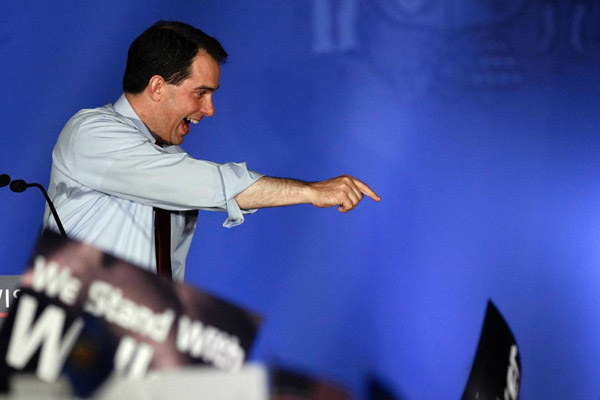
* "A Vast Wall of Money": Scott Walker outspent Tom Barrett about seven to one.
* Don't Blame Citizens United, At Least Not Entirely, About That: A lot of attention has been given to the recent Supreme Court decision that nullified Wisconsin's century-old ban on corporate campaign cash, and others like it across the country. But Walker was the beneficiary of an Wisconsin law passed in 1987 (and supported by Barrett) that directly tilted the playing field in his favor: in a recall, the politician being recalled can accept donations of unlimited size from individuals. The opponent can't; donations are capped at $10,000. According to my calculations from Wisconsin State-Journal data, Walker received 48 donations over $10,000 from individuals, for a total of $4,503,307—about half a million more than Barrett raised in total.
You could even argue that Citizens United benefited Barrett, at least in this specific instance, allowing Barrett to add substantially to his limited-by-law individual donations with PAC money. Walker also received lots of PAC money, but it gave Barrett leverage he otherwise wouldn't have had under the Wisconsin law.
But it's not all about the money:
* Madness Is Doing the Same Thing Over and Over Again, and Expecting the Same Result: In 2010, Scott Walker defeated Tom Barrett, 52.3 percent to 46.5 percent. In 2012, Walker defeated Barrett 53.2 percent to 46.3 percent, which was also in the ballpark of virtually every poll taken from October through June.
Which isn't to say that Wisconsin Democrats had an easy option. Longtime star Russ Feingold didn't run, despite being the presumptively most popular option. Barrett polled much better than former Dane County exec Kathleen Falk… yet in a race focused on collective bargaining, labor had a less-than-fully-cordial relationship with Barrett dating back to his proposed takeover of Milwaukee Public Schools (producing tensions not unlike what you're seeing in Chicago). AFSCME, a $500k donor to the We Are Wisconsin PAC, actually tried to talk Barrett out of the race at the end of last year in favor of Falk.
That produced a tough choice—continue to back Falk at a time and money cost when her position against Barrett wasn't improving, or go with Barrett, who was showing broader popularity but didn't have the same support from labor.
Then again, maybe it didn't matter either way:
* Recall Elections Are Different From Regular Elections: Exit polls—yes, I know, but they weren't that far off at 52-48—found that 60 percent of recall voters are appropriate "only for official misconduct." 60 percent of those respondents voted for Walker. If that sounds contradictory,
A majority of Wisconsinites disapprove of Walker's performance, but that majority has varied from statistically negligible to significant but modest, and disapproval != voting against someone.
* Labor Isn't Doomed: I heard this from both proponents and opponents. Given substantial new hurdles—Wisconsin's limiting recall-finance laws, an aversion to performance-based recalls, and a not-ideal candidate who had lost to the same opponent just a couple years before—the result was virtually identical. It was neither a minor victory nor a major loss, for Walker or the unions. But while the latter can regroup for the next election, the pressure going forward will be on Walker to decide what the mandate of the recall was. Now, the hard decisions are the governor's.
Photograph: Chicago Tribune


